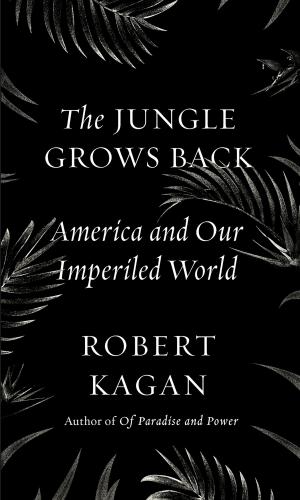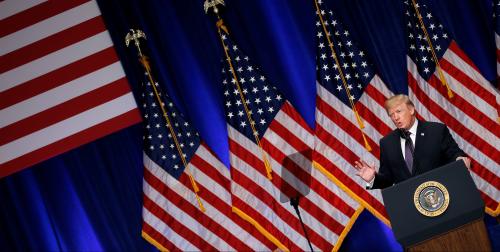For the first time in a generation, fundamental questions of America’s role in the world are at issue in a presidential election and the debate has already started among the likely candidates. The last time we had a major shift in foreign policy there wasn’t much debate: The post-9/11 world supplanted the post-Cold War world in a split-second. With the decimation of al-Qaida and the fall of Raqqa as the Islamic State’s de facto capital, counterterrorism lost its position as the organizing idea of foreign policy. In the absence of a challenger to President Trump, the debate will be on the Democratic Party side. A useful yardstick to sort out the debate is to ask whether candidates sound more like a Kennedy calling for robust internationalism or a McGovern saying it is time to “come home, America.”
Both precedents have continuing resonance and relevance; let’s start with Kennedy. Among some thinkers, there has been consternation that the “liberal international order” is at risk. They fear that the international institutions and norms that the United States help create after World War II are under siege from new authoritarian powers like Russia and China and that the United States will not or cannot defend that order. Before academics gave it the clunky name “the liberal international order,” the idea was expressed in a more straightforward way: The United States, and by definition its president, was the “Leader of the Free World.” John F. Kennedy’s 1961 inaugural speech was a pure expression of this idea: “We shall pay any price, bear any burden, meet any hardship, support any friend, oppose any foe to assure the survival and the success of liberty.” Modern-day Kennedys see the threat of authoritarianism, the chaos of international and domestic politics, and seek to summon the power of the United States to confront evil and restore order. For them, U.S. leadership and active participation in the world is not a mere preference, it is an imperative.
No Democrat has laid out a modern Kennedy vision yet, which is somewhat ironic because a Kennedy message would contrast more clearly with President Trump’s neo-isolationism. In the meantime, once and future Democratic foreign policy hands are carrying the Kennedy torch while waiting for a candidate to back. Last month, former Hillary Clinton and Joe Biden advisor Jake Sullivan made the case for American leadership in the Atlantic magazine, albeit with some hesitancy. He writes that “[d]espite its flaws, America possesses distinctive attributes that can be put to work to advance both the national interest and the larger common interest.” This seems like Kennedy with a caveat. Former Deputy Secretary of State Anthony Blinken and Brookings’s Robert Kagan laid out a set of policy recommendations consistent with Sullivan’s approach a couple weeks ago. Perhaps the most Kennedy-like voice is Brookings’s Tom Wright, who recently wrote that the organizing principle for a progressive foreign policy should be one where the United States competes “with authoritarian states to preserve and strengthen an international system that protects freedom and liberty at home.” If a full-blown Kennedy emerges, an heir to Ted Sorenson could probably work with that kind of language.
The other end of the spectrum from Kennedy is George McGovern’s 1972 Democratic presidential nomination acceptance speech in the waning days of the Vietnam War when he called for American to “come home.” He proclaimed:
“Let us resolve that never again will we send the precious young blood of this country to die trying to prop up a corrupt military dictatorship abroad. This is also the time to turn away from excessive preoccupation overseas to the rebuilding of our own nation. America must be restored to a proper role in the world. But we can do that only through the recovery of confidence in ourselves.”
For McGovern, there were limits to the burdens we would bear. The primary way to advance freedom abroad was to disengage with dictators. Our concerns were now at home, not abroad. To be the leader of the free world meant being an example of freedom, not its guarantor. As we come up on two decades of conflict in Iraq and Afghanistan, McGovern’s post-Vietnam message certainly has appeal.
Two likely presidential candidates have already given their “big foreign policy” statements and they are both firmly in the McGovern camp. Senator Elizabeth Warren spoke at American University and Independent-Socialist Senator Bernie Sanders at the Johns Hopkins School of Advanced International Studies. For both Sanders and Warren, the military is something to be used sparingly and its budget trimmed. They argue America’s strength must be shored up at home before it should be projected abroad. The primary problem at the international level for both candidates is one of economics. For Warren, the rapacious capitalist system gutting the middle class must be reformed. For Sanders, voters of the world must unite to confront the power of oligarchs whether they be in Russia, China, or Kansas. While their analysis of the world’s problems includes warnings against authoritarianism consistent with Kennedy, these agendas strongly echo McGovern.
Despite the inclination to follow the horse-race aspect of the 2020 election, substantive issues matter too. As the saying goes, “elections have consequences.” In this case, it may determine America’s role in the world for a generation.
The views expressed here are the views of the author only, and do not reflect the views of the U.S. government.
The Brookings Institution is committed to quality, independence, and impact.
We are supported by a diverse array of funders. In line with our values and policies, each Brookings publication represents the sole views of its author(s).






Commentary
As the 2020 race gets started, so too do key foreign policy debates
January 15, 2019